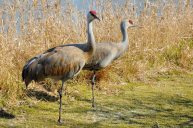A Georgia collector has found himself in hot water facing a fine of $900,000 for the largest taxidermy collection of illegal birds in history. Ultimately, a federal judge found two men guilty of trafficking hundreds of protective birds. They also were accused of trafficking bird eggs and targeting endangered species as well.
In total, authorities seized a collection of 1,401 taxidermy birds and 2,594 eggs. The USFWS National Fish and Wildlife Forensics Lab says that it has never seen a collection on this scale before. The court found Georgia native John Waldrop guilty of importing these birds and eggs without either declarations or permits. They found that he recruited caretaker Toney Jones to oversee the shipments of the birds.
"The scale of this investigation underscores the critical importance of protecting our natural resources," assistant director Douglas Ault of the USFWS Office of Law Enforcement said in a statement. "Waldrop's collection included thousands of bird specimens and eggs, many of which are among the rarest in the world ... We will remain vigilant and will continue to hold accountable those who exploit our shared natural resources for personal gain."




